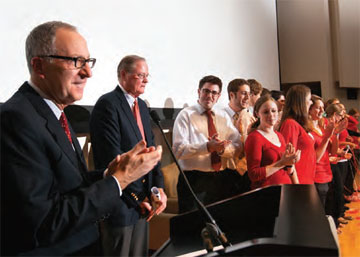Sustainability is a critical and timely research area, a focus of student activism, a foundational principle in new campus construction, and a key consideration for our campus operations—encompassing energy, climate, water, food, waste, buildings, people, land, purchasing, and transportation. All of us, on Cornell’s campuses and in the wider Cornell community, can be very proud of our university’s leadership in this area. But global problems related to sustainability are manifold, and we cannot rest on past accomplishments. Here is what Cornell is doing in this exceedingly important sphere.
Sustainability is reflected in our strategic plan, which has among its objectives effective stewardship of the natural and built environment. Earlier this year, our attention to sustainability across multiple dimensions earned Cornell a gold-level national sustainability rating on the Sustainability Tracking, Assessment, and Rating System (STARS) self-assessment system.

Last month, in a first-of-its-kind partnership, Cornell’s David R. Atkinson Center for a Sustainable Future joined forces with CARE, the international relief and development organization, to tackle global poverty and the impacts of climate change. Generous gifts from David Atkinson ’60 and Pat Atkinson to both Cornell and CARE have provided start-up funding for the Atkinson Center’s Impact through Innovation Fund, which matches Cornell researchers with CARE development professionals in projects designed to break the cycle of poverty, particularly for women and families. Work is already under way in Ethiopia, Mozambique, and elsewhere in the developing world.
With leadership from the Atkinson Center, Cornell faculty, students, and staff, along with external partners, are working to create knowledge across broad areas of sustainability involving energy, the environment, and economic development. To date, Atkinson Center researchers have leveraged $10 million in seed funding into more than $90 million in external support—with projects ranging from assessing carbon sequestration in agricultural landscapes to using algae as biofuel.
The Atkinson Center has also contributed to our faculty renewal efforts with a cluster-hiring program that offers bridging and start-up funding directly to colleges, schools, and departments for faculty recruitment in cross-cutting areas of importance to sustainability research (www.sustainablefuture.cornell.edu/about/fac-hiring.php).
On the Ithaca campus, all new construction over $5 million must attain a rating of silver or better under the Leadership in Energy and Environmental Design (LEED) Green Building Rating System. We have exceeded that requirement on several new buildings, including the Combined Heat and Power Plant, the Animal Health Diagnostic Center, the new Human Ecology Building, the Physical Sciences Building, the Brian Nevin Welcome Center at Cornell Plantations, and Weill Hall, all of which have achieved or are pursuing gold-level certification. The entire CornellNYC Tech campus on Roosevelt Island in New York City will achieve, at a minimum, a LEED silver rating. Additionally, the first building—the academic building—is aiming to be net-zero. It will harvest as much energy from its site, from solar and geothermal sources, as it consumes—making it one of the premier green buildings in the nation.
More than thirty student organizations have taken the lead in helping the University address sustainability challenges. Among other activities, student organizations run Dilmun Hill organic farm and a farmers’ market on Ho Plaza—and students manage the Big Red Bikes bike-share program; Lights Off Cornell, which uses volunteers to turn off lights in campus buildings after hours; and Take Back the Tap, which encourages the use of filtered tap water, rather than bottled water, for drinking.
The Cornell Climate Action Plan has set the Ithaca campus on a path to carbon neutrality by 2050. In the first two years of the plan, we reduced greenhouse gas emissions by 25 percent, thanks to the high performance of the Combined Heat and Power Plant and a decision to eliminate all coal combustion at the University. With Ithaca College, Tompkins Cortland Community College, local organizations, businesses, and municipalities, we are also part of the Tompkins County Climate Protection Initiative, which aims to mobilize local resources to accelerate the transition to a clean energy economy.
I invite you to keep abreast of our efforts by checking out the websites for the Atkinson Center (www.acsf.cornell.edu) and Cornell Sustainable Campus (www.sustainablecampus.cornell.edu) and to suggest opportunities to leverage our efforts to create a more sustainable campus and world.


